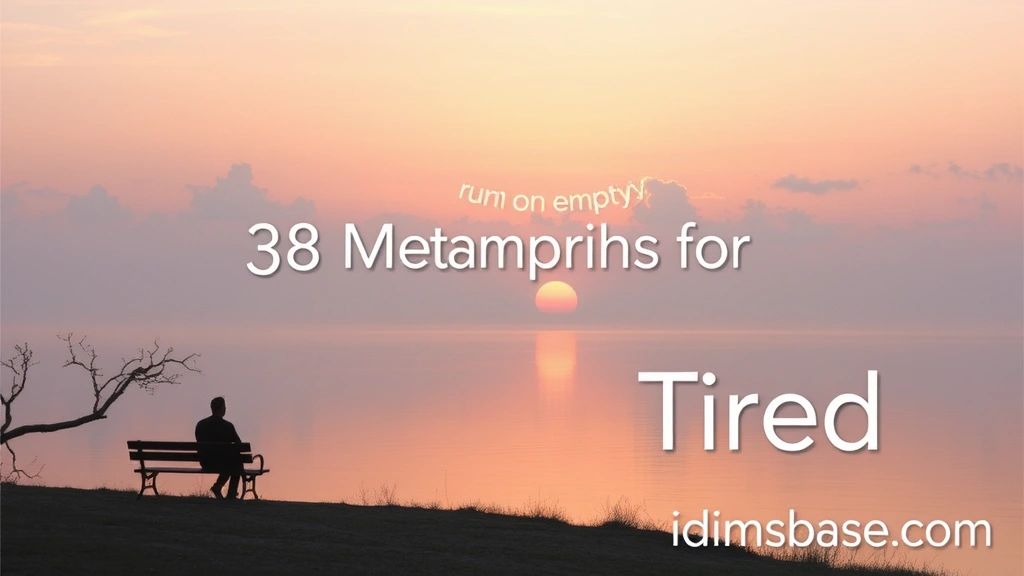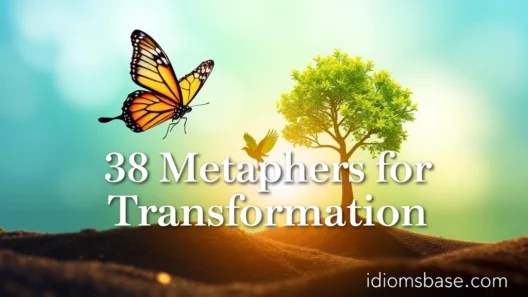Feeling utterly drained and searching for the perfect words to describe that bone-deep weariness? You've come to the right place! Sometimes "tired" just doesn't cut it, right? We've all been there – that moment when your eyelids feel like lead weights and your brain feels like mush. But how do you truly convey that feeling without sounding repetitive?
Well, get ready to supercharge your vocabulary and find just the right metaphor to capture your fatigued state! We're about to dive into a treasure trove of vivid, relatable, and sometimes even humorous ways to say you're tired. Whether you're writing, speaking, or just trying to express yourself better, these metaphors will add a splash of color and depth to your descriptions.
Metaphors for Tired: A Deep Dive into Weariness
Let's explore some fantastic ways to describe feeling tired, from the utterly exhausted to the simply worn out. You'll find that many of these paint a picture of physical and mental depletion, often drawing on common experiences.
The Utterly Drained and Spent
These metaphors emphasize a complete lack of energy, as if everything has been used up.
- Running on fumes: Imagine your car's fuel light blinking frantically. That's you! You're operating on the bare minimum, with no reserves left. It perfectly captures that feeling of having nothing left in the tank.
- Flat battery: Just like your phone or car when it's completely dead. You're unresponsive, unable to function, and in desperate need of a recharge.
- Washed out: Picture an old piece of fabric that's lost all its color and vibrancy. This suggests a loss of energy and vitality, leaving you feeling pale and lifeless.
- Drained of energy: Simple, yet powerful. It implies that all your life force has been siphoned away, leaving an empty vessel.
- Running on empty: Similar to running on fumes, but perhaps even more stark. There's literally nothing left to give.
- Out of gas: A classic! You've come to a complete halt because your internal fuel supply is gone.
- Sapped of strength: This evokes a feeling of having your power or vigor slowly but surely taken away, leaving you weak.
- Burned out: This isn't just about being tired; it's about being exhausted to the point of emotional and mental breakdown, often from chronic stress.
- Worn to a frazzle: Imagine a rope that's been used so much it's frayed and falling apart. This describes extreme weariness, almost to the point of breaking.
- At the end of my rope: This implies not just physical tiredness, but also mental or emotional exhaustion, often coupled with frustration.
- On my last legs: You're barely standing, just about to collapse. It suggests extreme fatigue and a struggle to keep going.
- Like a rag doll: Limp, floppy, and without any internal structure or energy. You're completely yielding to gravity.
The Heavy and Slow
These metaphors convey a sense of physical burden and slowness, as if every movement is an effort.
- Eyelids are lead weights: That heavy, dragging sensation when you can barely keep your eyes open. It's incredibly relatable!
- Body feels like a ton of bricks: Every limb feels incredibly heavy and difficult to lift. You're weighed down by fatigue.
- Moving through molasses: Every action, every thought, feels incredibly slow and sticky, as if you're trying to wade through a thick, syrupy substance.
- Brain is mush: Your cognitive functions are impaired; thinking clearly feels impossible. It's like your brain has lost its firmness and clarity.
- Feet are anchors: You feel rooted to the spot, unable or unwilling to move, as if heavy weights are dragging you down.
- Like a zombie: You're walking around, but without much awareness or energy, just going through the motions.
- Heavy-lidded: Your eyelids feel like they're being pulled down, making it hard to keep them open.
- Dragging myself around: Every step is an effort, as if you're pulling a heavy load behind you.
- Like a deflated balloon: All the air (energy) has gone out of you, leaving you limp and without bounce.
The Worn and Weathered

These metaphors suggest a cumulative effect of fatigue, like something that has been through a lot.
- Worn out: Simple, yet effective. Like an old pair of shoes that have seen too many miles.
- Beat down: Implies that life or circumstances have relentlessly pounded you, leaving you exhausted and perhaps a bit defeated.
- Frayed at the edges: Like a piece of fabric that's starting to unravel. It suggests you're losing your composure or ability to cope.
- Like an old shoe: Comfortable, perhaps, but certainly not spry or new. It implies being well-used and past your prime energy-wise.
- Weather-beaten: Like something that has endured harsh conditions and is showing the signs of it. You've been through a lot, and it shows.
The Fragile and Breaking
These metaphors hint at a state of near collapse, where you're on the verge of giving up.
- Ready to drop: You're so tired you could just fall over right where you stand.
- About to collapse: Similar to ready to drop, but perhaps even more immediate and dramatic.
- My wires are crossed: This suggests mental fatigue, where your thoughts are jumbled and you're making mistakes.
- Brain is fried: Your brain feels overworked and damaged, unable to process anything else.
- Lost my sparkle: You've lost your usual vibrancy, enthusiasm, and zest for life due to exhaustion.
The Sleep-Deprived and Dreaming

These metaphors focus on the desperate need for sleep.
- Counting sheep backwards: You're so tired you can't even get the simple act of counting sheep right.
- Seeing double: A classic sign of extreme sleep deprivation, where your vision blurs.
- In a fog: Your mind feels cloudy and unclear, as if you're walking through a thick mist.
- Nodding off: Your head keeps slumping forward as you fight the urge to sleep.
- My bed is calling my name: That undeniable pull towards your pillow, a desperate craving for rest.
- Like a sleepwalker: You're technically awake, but your mind is elsewhere, detached and dreamy.
- One eye open, one eye closed: You're struggling to stay awake, perhaps literally, trying to keep watch while also giving in to sleep.
Key Takeaways
- "Tired" is just the beginning: There's a whole spectrum of fatigue, and metaphors help us pinpoint the exact feeling.
- Vivid imagery: The best metaphors for tired paint a clear picture in the reader's mind, making your description more impactful.
- Relatability is key: Many of these metaphors draw on common experiences, making them easy for anyone to understand.
- Convey depth: Using a metaphor instead of a literal description adds depth and emotion to your expression of tiredness.
- Choose wisely: The right metaphor depends on the specific nuance of your fatigue – whether it's physical, mental, or a mix of both.
Frequently Asked Questions
Q1: Why should I use metaphors instead of just saying "I'm tired"?

Using metaphors adds richness, depth, and vividness to your language. It helps your audience truly feel what you're trying to convey, rather than just intellectually understanding it. For example, "I'm running on fumes" tells a much more compelling story than simply "I'm tired." It shows extreme depletion and a desperate need for rest, creating a stronger connection with your listener or reader.
Q2: Are these metaphors suitable for both writing and speaking?
Absolutely! These metaphors are fantastic for both written and spoken communication. In writing, they can make your prose more engaging and descriptive. In conversation, they can help you express your feelings more clearly and memorably, often eliciting a chuckle or nod of understanding from your audience. They add character to your speech!
Q3: How can I choose the best metaphor for my situation?
Consider the specific type of tiredness you're feeling.
- Are you physically exhausted? "Body feels like a ton of bricks."
- Is your mind completely drained? "Brain is mush" or "My wires are crossed."
- Are you utterly depleted with no energy left? "Running on fumes" or "Flat battery."
- Are you just about to give up? "Ready to drop" or "On my last legs."
The key is to pick the metaphor that most accurately and evocatively describes your unique feeling of fatigue.
Q4: Can I combine these metaphors?
While you can technically combine them, it's often best to stick to one strong metaphor at a time to avoid confusing your audience. For example, saying "My eyelids are lead weights and my body feels like a ton of bricks" works because they describe different aspects of physical tiredness. However, saying "I'm running on fumes and I'm a flat battery" might be a bit redundant as they convey very similar ideas. Focus on impact and clarity!
Q5: Will using these metaphors make me sound more articulate?
Definitely! Using vivid and appropriate metaphors shows a command of language and an ability to express complex feelings in creative ways. It makes your communication more interesting, memorable, and impactful, elevating your articulation beyond basic vocabulary. People often appreciate the effort and creativity.
So, the next time you're feeling utterly wiped out, don't just say you're tired. Pick one of these fantastic metaphors and paint a picture of your weariness! You'll be amazed at how much more effectively you can communicate your state, and perhaps even get that much-needed rest you deserve. Sweet dreams!






